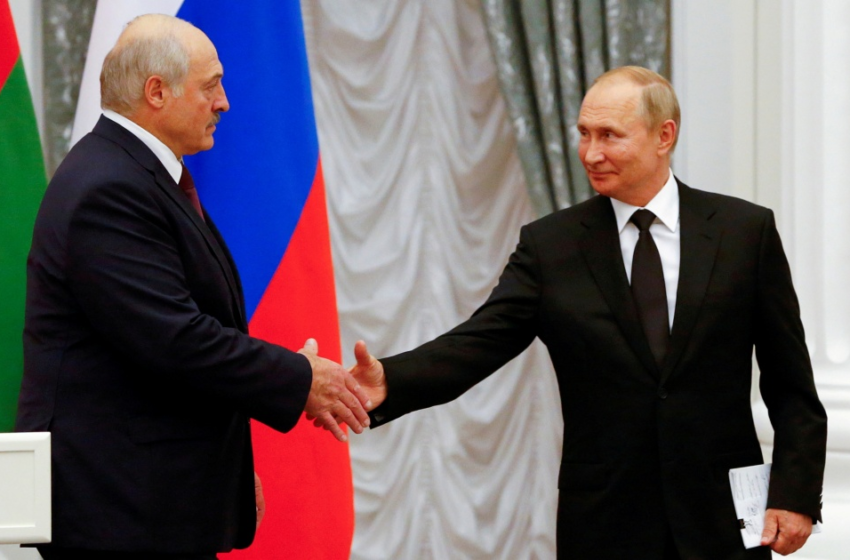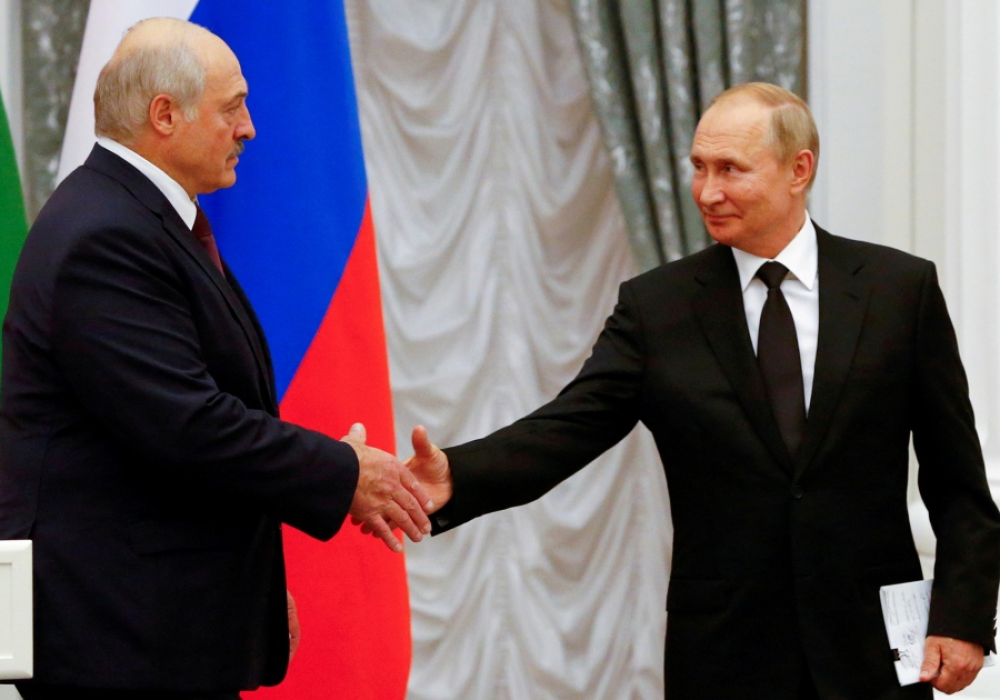As thousands of migrants are stranded in subzero temperatures on the forested border between Belarus and Poland, few doubt that Belarusian President Alexander Lukashenko deliberately stoked the crisis to enrage the European Union.
But what is the Kremlin’s role in the crisis?
And how independent is it in trying to de-escalate the crisis between Belarus, its oldest ally, and the EU, its largest trading partner whose thirst for Russia’s oil and gas largely keeps the Kremlin afloat economically?
“Lukashenko does it all with the Kremlin’s blessing. He’s like a cornered rat, and Moscow is his only protector,” Pyotr Lysevich, a Belarusian graphic designer who fled to neighbouring Ukraine following last year’s opposition protests against Lukashenko’s sixth presidential victory, told Al Jazeera.
Economically, politically and even linguistically, Belarus resembles Russia’s weaker, smaller conjoined twin.
For decades, the Kremlin shielded Lukashenko from Western ostracism and propped his economy with multibillion loans and hydrocarbons sold at throwaway prices.
Moscow removed bureaucratic hurdles for hundreds of thousands of Belarusian labour migrants – and dispatched a team of its best TV propagandists to “improve” the coverage of last year’s protests that convulsed the nation of 9.5 million for weeks after Lukashenko’s “victory” with alleged 80 percent of the vote.
The West called the vote rigged, did not recognise Lukashenko as Belarusian president and imposed tougher sanctions on his government leaving him with no lifeline but the umbilical cord that ties him to Russia.
The refugee crisis certainly looks like Lukashenko’s revenge – and a well-calculated attempt to provoke Poland, the EU and the collective West.
“Lukashenko created a classic casus belli,” Nikolay Mitrokhin, a researcher at Germany’s Bremen University, told Al Jazeera.
By letting thousands of people, reportedly mostly Kurds from Iraq and Syria, fly to Belarus as “tourists” and directing them to the Polish border, Lukashenko wants Warsaw to run out of patience.
Poland has said it will hold emergency talks with NATO over the crisis, while the United Kingdom dispatched a small group of troops to “provide engineering support” at the border.
Lukashenko wants Poland to “respond with an intervention, at least in the framework of a humanitarian operation”, Mitrokhin said.
But Belarus is not quite a sovereign nation. Unlike other ex-Soviet nations, it created a “union state” with Russia that eventually has to have a common government, currency and military.
The deal was struck back in 1997, when Lukashenko hoped to replace the ailing, alcoholic Russian President Boris Yeltsin. But after teetotal ex-KGB colonel Vladimir Putin was elected in 2000, Lukashenko kept postponing the merger.
Last year’s protests showed, however, that he has little room for political horse-trading with Moscow.
“So, it is impossible to imagine that Belarus has provoked a military conflict with its neighbour without the support” from the Kremlin, Mitrokhin concluded.
Minsk and Moscow may de-escalate the refugee crisis after the EU and its most powerful member, Berlin, agree to remove sanctions from Lukashenko’s administration – and certify Nord Stream 2, a pipeline that will deliver Russian natural gas directly to Germany across the Baltic Sea.
Other observers believe that Lukashenko will use the intervention as a pretext to declare martial law and let Russian troops enter Belarus as “peacekeepers”.
Instead of finalising the “union state” – and triggering fierce popular protests – Lukashenko wants to secure his lifelong stay in power, even as a virtual Kremlin puppet, as the sole guarantor of the Russian occupation.
“Lukashenko will remain a very important person for Putin, a virtually irreplaceable one – because the legitimacy of Russia’s military presence will only be guaranteed if the formal head of state agrees,” Vitali Shkliarov told Al Jazeera.
Shkliarov worked on Barack Obama’s and Bernie Sanders’ campaigns in the United States, promoted opposition politicians in Russia, and was jailed and tortured in Belarus after working with an opposition candidate in last year’s election.
A direct confrontation between Moscow and Brussels will also foot Lukashenko’s bills.
“This way, Russia will have to become a subject of a half-military conflict and a dependent partner forced to pay Lukashenko ‘credit’ after ‘credit’,” Shkliarov said.
Other analysts disagree – and say a refugee crisis is a way for Lukashenko to overcome his nearly absolute reliance on Moscow.
“I don’t think that Lukashenko is under Putin’s thumb. On the contrary, Lukashenko is trying to escape his full dependence on the Kremlin while trying to manipulate both the Kremlin and Putin,” Pavel Luzin, a Russia-based analyst for the Jamestown Foundation, a think-tank in Washington, DC, told Al Jazeera.
In return for the de-escalation, Lukashenko wants Brussels to recognise his re-election and start political haggling.
“He needs the West to recognise his power, begin talking to him. So far, he’s not doing well, but Lukashenko has nowhere to go – and he is improvising,” he said.
Meanwhile, the Kremlin’s spin doctors defend Lukashenko – and fan the flames of anti-Polish propaganda that dates back to centuries of czarist and Soviet Russia’s control over Poland.
“Poland refuses to cooperate with Belarus, refuses to respect the human rights of the migrants,” pro-Kremlin analyst Sergey Markov told the Belarus 1 television network on Saturday.
“Poland chose the way of political war. Needless to say, this is the traditional choice of the Polish ruling class, the way it almost always chooses,” he said.
Lukashenko, an ex-collective farm chairman, has been the first and only elected president of Belarus since 1994. He preserved collective farms and state-owned plants where farmers and workers receive meagre yet stable incomes.
His political opponents disappeared without a trace or fled the country, while small, urban protests against each of his re-elections were dispersed with violence and arrests.
For decades, Moscow supplied Belarus with discounted crude that was processed at two giant refineries and resold to Ukraine and the Eurasian Economic Union (EEU).
Even though one-fifth of the Belarusian territory was contaminated after the 1986 Chernobyl nuclear explosion in Ukraine, Russia never questioned the quality of Belarusian milk and meat.










